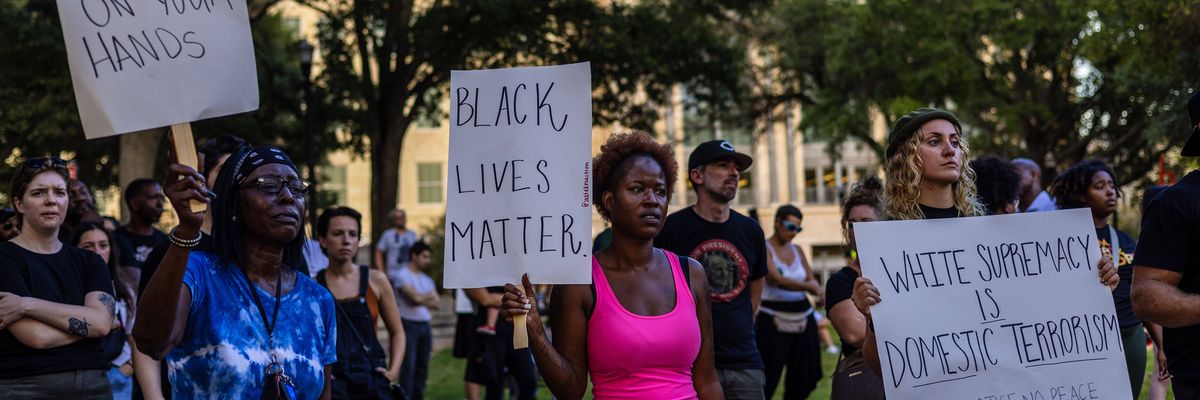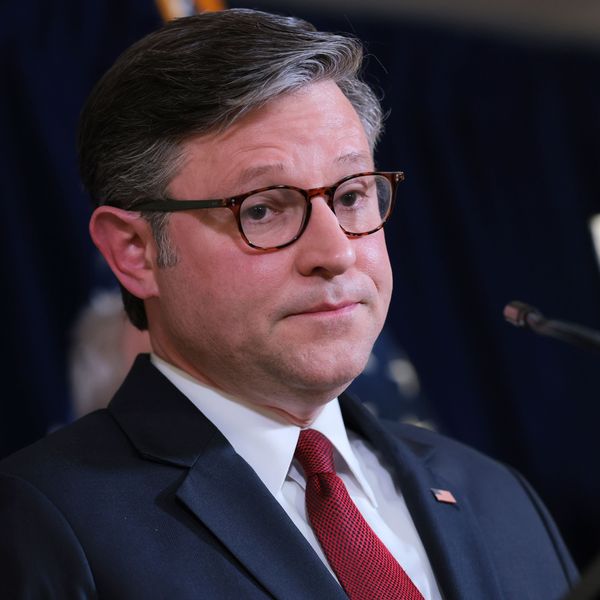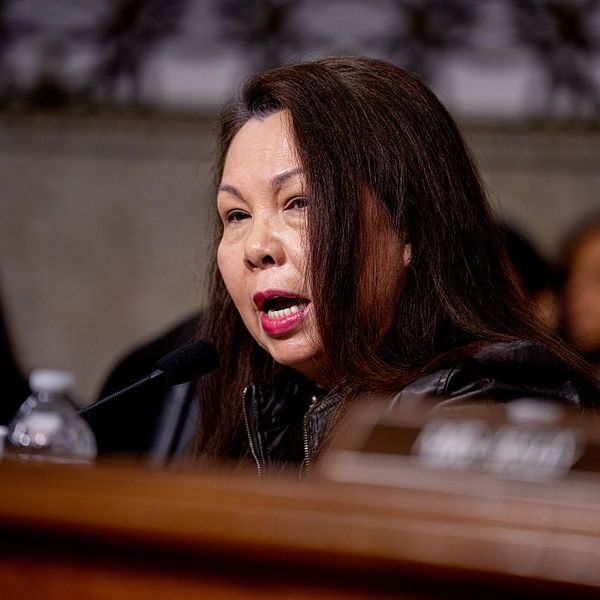
People attend a rally at James Weldon Johnson Park to honor the victims of a deadly shooting in Jacksonville, Florida on August 28, 2023.
Watchdog Argues Obama Admin's Cave on White Supremacy Helped Pave Way for Jacksonville Shooting
"We must not be fooled into treating each massacre as its own tragedy," said one civil rights advocate. "The tragedy first lies in the unchecked proliferation of the violent racist ideology coupled with the unchecked access to weapons of war."
As the community of Jacksonville, Florida reeled from the killing of three Black Americans by a white supremacist at a Dollar General store last Saturday, a government watchdog said that the "lion's share" of blame for the proliferation of racist, white nationalist violence in the U.S. can be placed on Republican politicians including Florida Gov. Ron DeSantis and former President Donald Trump—but noted that the Obama administration helped allow white supremacy to fester by caving to the GOP at a crucial moment more than a decade ago.
Chris Lewis, a senior researcher at the Revolving Door Project, pointed to the Democratic administration's response when Republican lawmakers complained about a Department of Homeland Security (DHS) report in 2009 that warned of the growth of right-wing extremism, including the white supremacist movement, and the danger it posed to communities across the United States.
The report prompted calls for then-Homeland Security Secretary Janet Napolitano's resignation from Republicans including then-House Minority Leader John Boehner (R-Ohio), who said the report could be about "two-thirds of Americans, who, you know, who might go to church, who may have served in the military, who may be involved in community activities"—suggesting this was evidence that the threat should not be addressed rather than a dangerous sign of the influence of white supremacy across American life.
Instead of defending the report, Napolitano told journalists that the document "was not well-written" and "should not have gone out in the form it did," adding that she had formally apologized to veterans who were offended by the document's warnings about white nationalism in the military.
But as Napolitano withdrew the report and, according to The New York Times, "essentially disbanded" DHS programs aimed at fighting white supremacist domestic terrorism, the problem was in fact intensifying within the military and other institutions. One 2020 Military Times poll found that "more than half of minority service members say they have personally witnessed examples of white nationalism or ideologically-driven racism within the ranks in recent months."
"In the 14 years since the report was released and then quashed, right-wing groups have increased the size of their ranks and unleashed violence against marginalized individuals with growing frequency," wrote Lewis. "In addition, they have increased their presence in the nation's military and policing institutions. Far-right extremists' infiltration of the armed forces and law enforcement now poses an internal threat to the state's security apparatus."
After withdrawing the report, Lewis noted, DHS reduced the number of staffers analyzing all domestic terrorism that was unrelated to Islam, canceled state and local law enforcement briefings about the threat of white nationalism, and declined to publicize more than a dozen reports on the matter.
"There was some talk in the administration about the potential harm it would do to turn a blind eye to those groups," he wrote. "And yet, that's precisely what the White House did, deferring to Republicans and ultimately contributing to this dangerous moment in history."
The shooter in Jacksonville last week perpetrated just one of at least 267 right-wing domestic terrorist plots that have been planned or carried out since 2015. More than 90 people have been killed in those attacks, with the majority murdered by white supremacists who targeted Jewish people, Black people, immigrants, or people in the LGBTQIA+ community.
The Biden administration now has "an opportunity to rectify this problem," said Lewis, by declaring white supremacist violence a national emergency and allocating federal resources to fighting the threat.
Following the attack, Sherrilyn Ifill, a senior fellow at the Ford Foundation and former president of the NAACP Legal Defense Fund, called for "a federal investigation into white supremacist violence, using the power and investigatory tools available to every federal agency."
"We cannot be expected to live like this," said Ifill. "It is not 1877. We must not be fooled into treating each massacre as its own tragedy. The tragedy first lies in the unchecked proliferation of the violent racist ideology coupled with the unchecked access to weapons of war."
The Obama administration, wrote Lewis, silenced a report that "could have saved lives."
"Instead of ignoring House Republicans crying wolf over the Department of Homeland Security daring to scrutinize right-wing extremists, and brushing off the falsehoods of conservative commentators like Rush Limbaugh who claimed that 'there is not one instance they can cite as evidence where any of these right-wing groups have done anything,' the Obama administration bowed its head to the mob and neutered its own ability to combat domestic terrorism," he added in a statement. "Now, a decade later, here we are. The Biden administration should not repeat this mistake and should allocate resources to this."
Damon Hewitt, president and executive director of the Lawyers' Committee for Civil Rights Under Law,
noted that the "broader context" for the Jacksonville shooting includes "elected officials like Florida Governor Ron DeSantis and other state legislators are intent on implementing racist policies and passing anti-Black legislation designed to stoke racial animus, which inevitably leads to violence."
"Congress must allocate more funding and resources to investigate and prosecute hate crimes on a national scale," Hewitt added, "and to provide more training for state and local law enforcement to effectively police hate crimes—which must include stronger regulations on the ability to obtain firearms."
An Urgent Message From Our Co-Founder
Dear Common Dreams reader, The U.S. is on a fast track to authoritarianism like nothing I've ever seen. Meanwhile, corporate news outlets are utterly capitulating to Trump, twisting their coverage to avoid drawing his ire while lining up to stuff cash in his pockets. That's why I believe that Common Dreams is doing the best and most consequential reporting that we've ever done. Our small but mighty team is a progressive reporting powerhouse, covering the news every day that the corporate media never will. Our mission has always been simple: To inform. To inspire. And to ignite change for the common good. Now here's the key piece that I want all our readers to understand: None of this would be possible without your financial support. That's not just some fundraising cliche. It's the absolute and literal truth. We don't accept corporate advertising and never will. We don't have a paywall because we don't think people should be blocked from critical news based on their ability to pay. Everything we do is funded by the donations of readers like you. Will you donate now to help power the nonprofit, independent reporting of Common Dreams? Thank you for being a vital member of our community. Together, we can keep independent journalism alive when it’s needed most. - Craig Brown, Co-founder |
As the community of Jacksonville, Florida reeled from the killing of three Black Americans by a white supremacist at a Dollar General store last Saturday, a government watchdog said that the "lion's share" of blame for the proliferation of racist, white nationalist violence in the U.S. can be placed on Republican politicians including Florida Gov. Ron DeSantis and former President Donald Trump—but noted that the Obama administration helped allow white supremacy to fester by caving to the GOP at a crucial moment more than a decade ago.
Chris Lewis, a senior researcher at the Revolving Door Project, pointed to the Democratic administration's response when Republican lawmakers complained about a Department of Homeland Security (DHS) report in 2009 that warned of the growth of right-wing extremism, including the white supremacist movement, and the danger it posed to communities across the United States.
The report prompted calls for then-Homeland Security Secretary Janet Napolitano's resignation from Republicans including then-House Minority Leader John Boehner (R-Ohio), who said the report could be about "two-thirds of Americans, who, you know, who might go to church, who may have served in the military, who may be involved in community activities"—suggesting this was evidence that the threat should not be addressed rather than a dangerous sign of the influence of white supremacy across American life.
Instead of defending the report, Napolitano told journalists that the document "was not well-written" and "should not have gone out in the form it did," adding that she had formally apologized to veterans who were offended by the document's warnings about white nationalism in the military.
But as Napolitano withdrew the report and, according to The New York Times, "essentially disbanded" DHS programs aimed at fighting white supremacist domestic terrorism, the problem was in fact intensifying within the military and other institutions. One 2020 Military Times poll found that "more than half of minority service members say they have personally witnessed examples of white nationalism or ideologically-driven racism within the ranks in recent months."
"In the 14 years since the report was released and then quashed, right-wing groups have increased the size of their ranks and unleashed violence against marginalized individuals with growing frequency," wrote Lewis. "In addition, they have increased their presence in the nation's military and policing institutions. Far-right extremists' infiltration of the armed forces and law enforcement now poses an internal threat to the state's security apparatus."
After withdrawing the report, Lewis noted, DHS reduced the number of staffers analyzing all domestic terrorism that was unrelated to Islam, canceled state and local law enforcement briefings about the threat of white nationalism, and declined to publicize more than a dozen reports on the matter.
"There was some talk in the administration about the potential harm it would do to turn a blind eye to those groups," he wrote. "And yet, that's precisely what the White House did, deferring to Republicans and ultimately contributing to this dangerous moment in history."
The shooter in Jacksonville last week perpetrated just one of at least 267 right-wing domestic terrorist plots that have been planned or carried out since 2015. More than 90 people have been killed in those attacks, with the majority murdered by white supremacists who targeted Jewish people, Black people, immigrants, or people in the LGBTQIA+ community.
The Biden administration now has "an opportunity to rectify this problem," said Lewis, by declaring white supremacist violence a national emergency and allocating federal resources to fighting the threat.
Following the attack, Sherrilyn Ifill, a senior fellow at the Ford Foundation and former president of the NAACP Legal Defense Fund, called for "a federal investigation into white supremacist violence, using the power and investigatory tools available to every federal agency."
"We cannot be expected to live like this," said Ifill. "It is not 1877. We must not be fooled into treating each massacre as its own tragedy. The tragedy first lies in the unchecked proliferation of the violent racist ideology coupled with the unchecked access to weapons of war."
The Obama administration, wrote Lewis, silenced a report that "could have saved lives."
"Instead of ignoring House Republicans crying wolf over the Department of Homeland Security daring to scrutinize right-wing extremists, and brushing off the falsehoods of conservative commentators like Rush Limbaugh who claimed that 'there is not one instance they can cite as evidence where any of these right-wing groups have done anything,' the Obama administration bowed its head to the mob and neutered its own ability to combat domestic terrorism," he added in a statement. "Now, a decade later, here we are. The Biden administration should not repeat this mistake and should allocate resources to this."
Damon Hewitt, president and executive director of the Lawyers' Committee for Civil Rights Under Law,
noted that the "broader context" for the Jacksonville shooting includes "elected officials like Florida Governor Ron DeSantis and other state legislators are intent on implementing racist policies and passing anti-Black legislation designed to stoke racial animus, which inevitably leads to violence."
"Congress must allocate more funding and resources to investigate and prosecute hate crimes on a national scale," Hewitt added, "and to provide more training for state and local law enforcement to effectively police hate crimes—which must include stronger regulations on the ability to obtain firearms."
- 'Wild and Timely' Report Details Infiltration of Far-Right Militias and White Supremacist Groups in US Police Departments ›
- House GOP Refuses to Denounce White Supremacy and 'Great Replacement' Theory ›
As the community of Jacksonville, Florida reeled from the killing of three Black Americans by a white supremacist at a Dollar General store last Saturday, a government watchdog said that the "lion's share" of blame for the proliferation of racist, white nationalist violence in the U.S. can be placed on Republican politicians including Florida Gov. Ron DeSantis and former President Donald Trump—but noted that the Obama administration helped allow white supremacy to fester by caving to the GOP at a crucial moment more than a decade ago.
Chris Lewis, a senior researcher at the Revolving Door Project, pointed to the Democratic administration's response when Republican lawmakers complained about a Department of Homeland Security (DHS) report in 2009 that warned of the growth of right-wing extremism, including the white supremacist movement, and the danger it posed to communities across the United States.
The report prompted calls for then-Homeland Security Secretary Janet Napolitano's resignation from Republicans including then-House Minority Leader John Boehner (R-Ohio), who said the report could be about "two-thirds of Americans, who, you know, who might go to church, who may have served in the military, who may be involved in community activities"—suggesting this was evidence that the threat should not be addressed rather than a dangerous sign of the influence of white supremacy across American life.
Instead of defending the report, Napolitano told journalists that the document "was not well-written" and "should not have gone out in the form it did," adding that she had formally apologized to veterans who were offended by the document's warnings about white nationalism in the military.
But as Napolitano withdrew the report and, according to The New York Times, "essentially disbanded" DHS programs aimed at fighting white supremacist domestic terrorism, the problem was in fact intensifying within the military and other institutions. One 2020 Military Times poll found that "more than half of minority service members say they have personally witnessed examples of white nationalism or ideologically-driven racism within the ranks in recent months."
"In the 14 years since the report was released and then quashed, right-wing groups have increased the size of their ranks and unleashed violence against marginalized individuals with growing frequency," wrote Lewis. "In addition, they have increased their presence in the nation's military and policing institutions. Far-right extremists' infiltration of the armed forces and law enforcement now poses an internal threat to the state's security apparatus."
After withdrawing the report, Lewis noted, DHS reduced the number of staffers analyzing all domestic terrorism that was unrelated to Islam, canceled state and local law enforcement briefings about the threat of white nationalism, and declined to publicize more than a dozen reports on the matter.
"There was some talk in the administration about the potential harm it would do to turn a blind eye to those groups," he wrote. "And yet, that's precisely what the White House did, deferring to Republicans and ultimately contributing to this dangerous moment in history."
The shooter in Jacksonville last week perpetrated just one of at least 267 right-wing domestic terrorist plots that have been planned or carried out since 2015. More than 90 people have been killed in those attacks, with the majority murdered by white supremacists who targeted Jewish people, Black people, immigrants, or people in the LGBTQIA+ community.
The Biden administration now has "an opportunity to rectify this problem," said Lewis, by declaring white supremacist violence a national emergency and allocating federal resources to fighting the threat.
Following the attack, Sherrilyn Ifill, a senior fellow at the Ford Foundation and former president of the NAACP Legal Defense Fund, called for "a federal investigation into white supremacist violence, using the power and investigatory tools available to every federal agency."
"We cannot be expected to live like this," said Ifill. "It is not 1877. We must not be fooled into treating each massacre as its own tragedy. The tragedy first lies in the unchecked proliferation of the violent racist ideology coupled with the unchecked access to weapons of war."
The Obama administration, wrote Lewis, silenced a report that "could have saved lives."
"Instead of ignoring House Republicans crying wolf over the Department of Homeland Security daring to scrutinize right-wing extremists, and brushing off the falsehoods of conservative commentators like Rush Limbaugh who claimed that 'there is not one instance they can cite as evidence where any of these right-wing groups have done anything,' the Obama administration bowed its head to the mob and neutered its own ability to combat domestic terrorism," he added in a statement. "Now, a decade later, here we are. The Biden administration should not repeat this mistake and should allocate resources to this."
Damon Hewitt, president and executive director of the Lawyers' Committee for Civil Rights Under Law,
noted that the "broader context" for the Jacksonville shooting includes "elected officials like Florida Governor Ron DeSantis and other state legislators are intent on implementing racist policies and passing anti-Black legislation designed to stoke racial animus, which inevitably leads to violence."
"Congress must allocate more funding and resources to investigate and prosecute hate crimes on a national scale," Hewitt added, "and to provide more training for state and local law enforcement to effectively police hate crimes—which must include stronger regulations on the ability to obtain firearms."
- 'Wild and Timely' Report Details Infiltration of Far-Right Militias and White Supremacist Groups in US Police Departments ›
- House GOP Refuses to Denounce White Supremacy and 'Great Replacement' Theory ›

